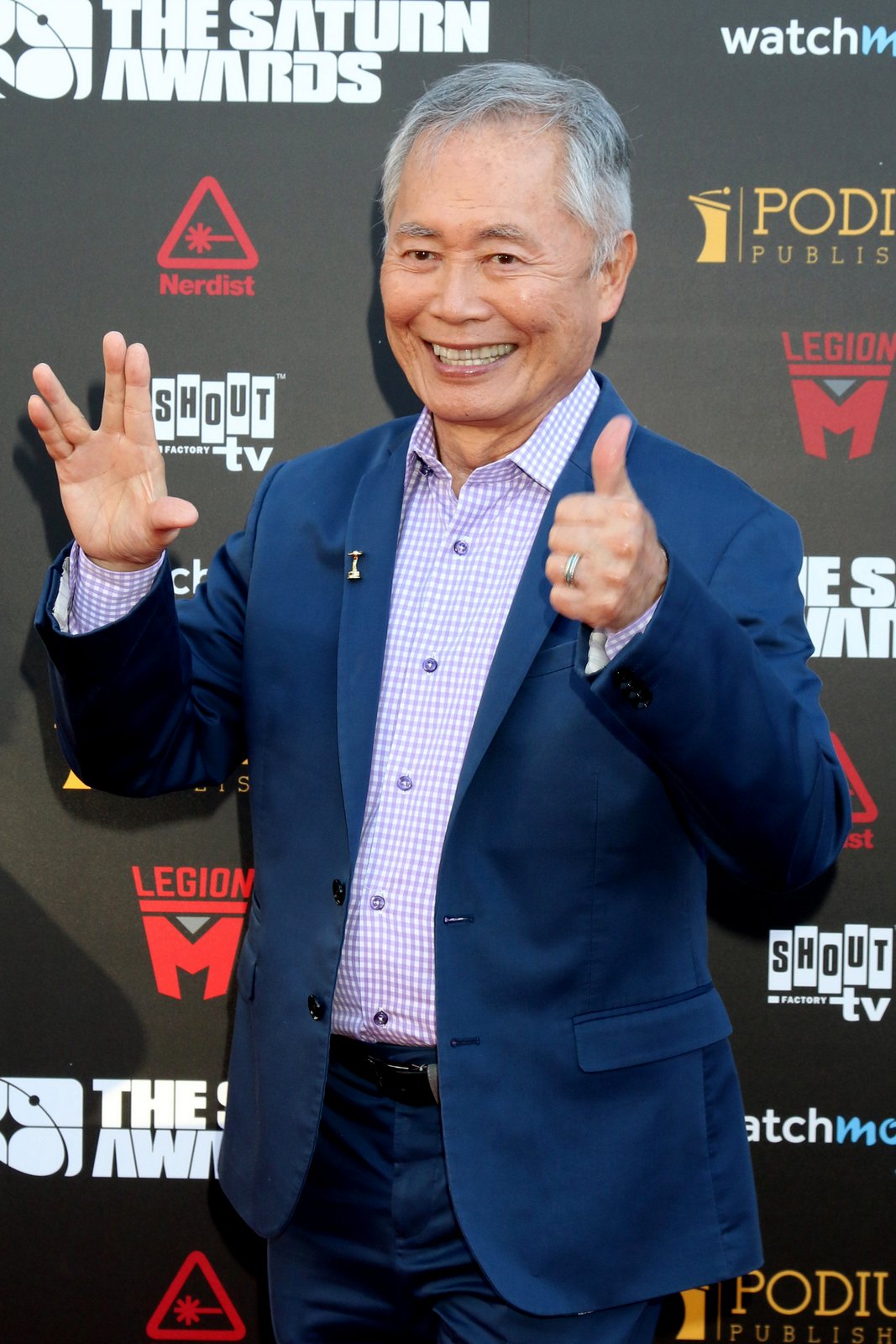When Star Trek debuted in 1966, its cast didn’t imagine it would last beyond three seasons. They didn’t know, decades later, that millions would still watch reruns, attend conventions and celebrate the series as a cultural touchstone.
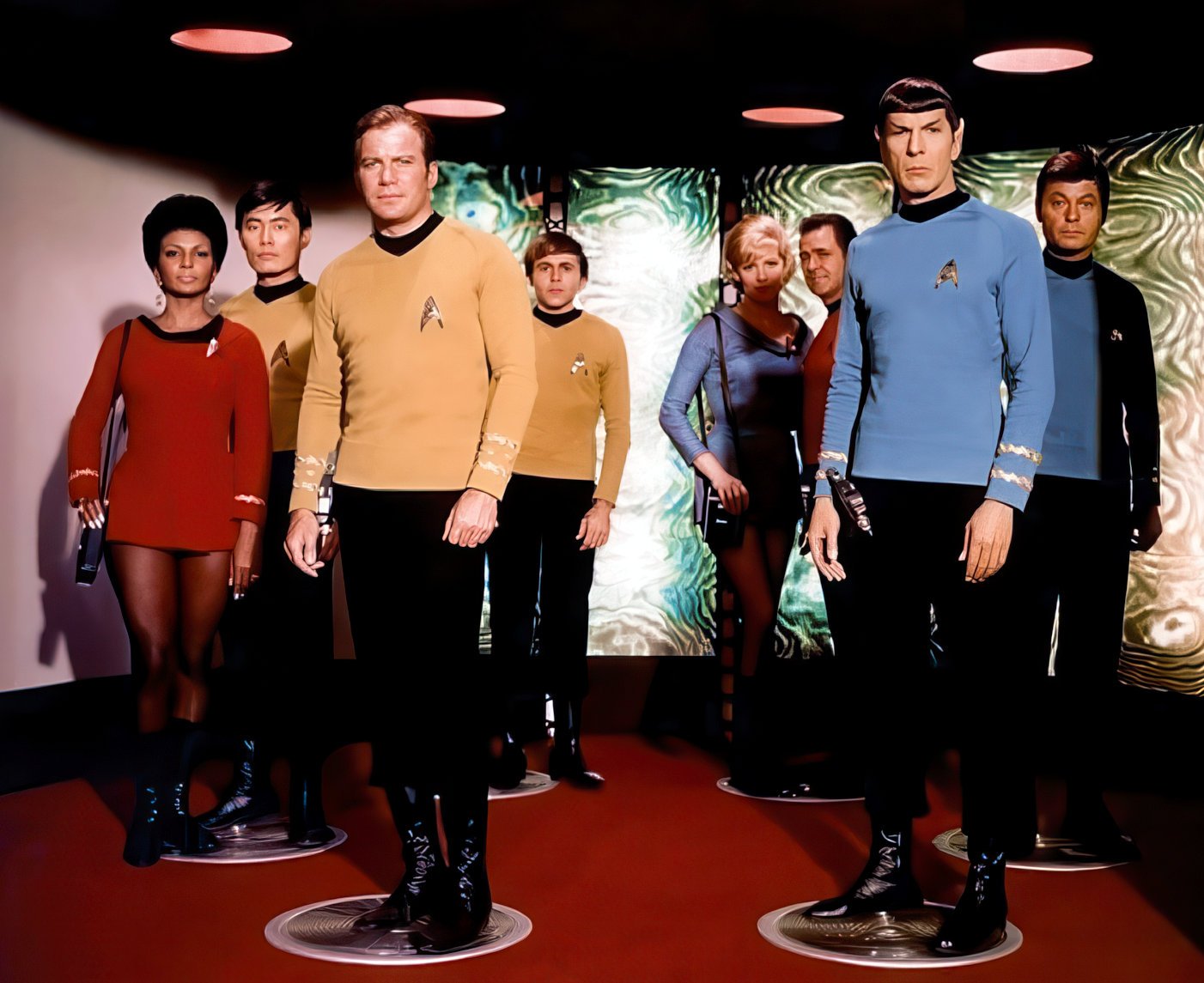
Takei was a young actor whose path to the Enterprise had its own twists. Born near Los Angeles in 1940, he spent part of his childhood in a Japanese‑American internment camp during World War II, a chapter of American history that shaped his family’s views on identity and belonging. After college, graduate study and theater training in the U.S. and abroad, he landed the role of Sulu — a thoughtful, capable helmsman whose presence helped reflect the show’s broader, hopeful vision of inclusion.
- Takei, George (Author)
- English (Publication Language)
- 208 Pages - 07/16/2019 (Publication Date) - Top Shelf Productions (Publisher)
Star Trek never dominated the ratings while it was on the air, but it resonated deeply with its audience. After cancellation in 1969, the show lived on in syndication and in the pages of early fanzines. Takei watched this unfold from a front‑row seat.
The explosion of fan mail, creative fan publications and organized gatherings — what he called “the Star Trek Phenomenon” — was unlike anything television had seen. Conventions sprung up around the world. At many of them, Takei was a regular guest, connecting with Trekkers of all ages. His willingness to show up, speak with fans and share stories helped him become one of the most visible cast members at these events.
VIDEO | George Takei shares his best of Star Trek

The show’s influence also spilled into real‑world culture. Takei pointed out how Star Trek’s fans helped persuade NASA to name the first space shuttle Enterprise, after the starship on which Sulu served. For him, that was evidence that fans’ enthusiasm could shape public life well beyond the fandom.
Life after Star Trek for Takei included a mix of entertainment and civic engagement. He took on occasional acting roles beyond the series, hosted a regional talk show and stayed active in political causes. His perspective on the series — and on the fan community that embraced it — was rooted in appreciation for both the storytelling and the way the show’s ideals connected with people. Creator Gene Roddenberry, he said, gave the cast characters with enough depth and nuance to make their interactions feel authentic, something audiences picked up on as the years went by.
VIDEO | George Takei reveals the origin of “Ohhh My”

Decades after Star Trek first aired, Takei’s association with the show has remained a defining part of his life. But it’s also clear he sees it as part of a larger conversation about representation, community and imagination. His journey from a Japanese‑American childhood to a role aboard the Enterprise and beyond reflects the unexpected ways television can touch real lives.
George Takei talks about the Star Trek Phenomenon and the power of the classic TV series (1976)
John Stanley, The San Francisco Examiner (California) November 28, 1976
No one, least of all George Takei, foresaw that playing a second banana Japanese spaceman named Sulu would lead to lasting recognition of a very special kind.
“In the beginning,” recalls the Japanese-American actor, “it was a nice TV role, but we were all forewarned not to expect the series to survive. After three seasons, ‘Star Trek’ was zapped by the network and everyone started looking for new jobs. How were we to know the thing we had created would survive beyond tomorrow?”
Tomorrow, and a few tomorrows beyond that. Takei, along with everyone else connected with NBC’s science-fiction adventure series (1966-69), found themselves pleasantly caught up in “The Star Trek Phenomenon.”
The Phenomenon is a way of life. It is a philosophy and a religion and a love to the millions who embrace it. It is an appreciation for the care producer Gene Roddenberry gave his space stories; it is a respect for the crew of the Enterprise: the humorless, emotionless Mr. Spock of Vulcan heritage; Captain James T. Kirk; Dr. McCoy; Irish engineer Scotty, bridge operative Uhura and helmsman Sulu.
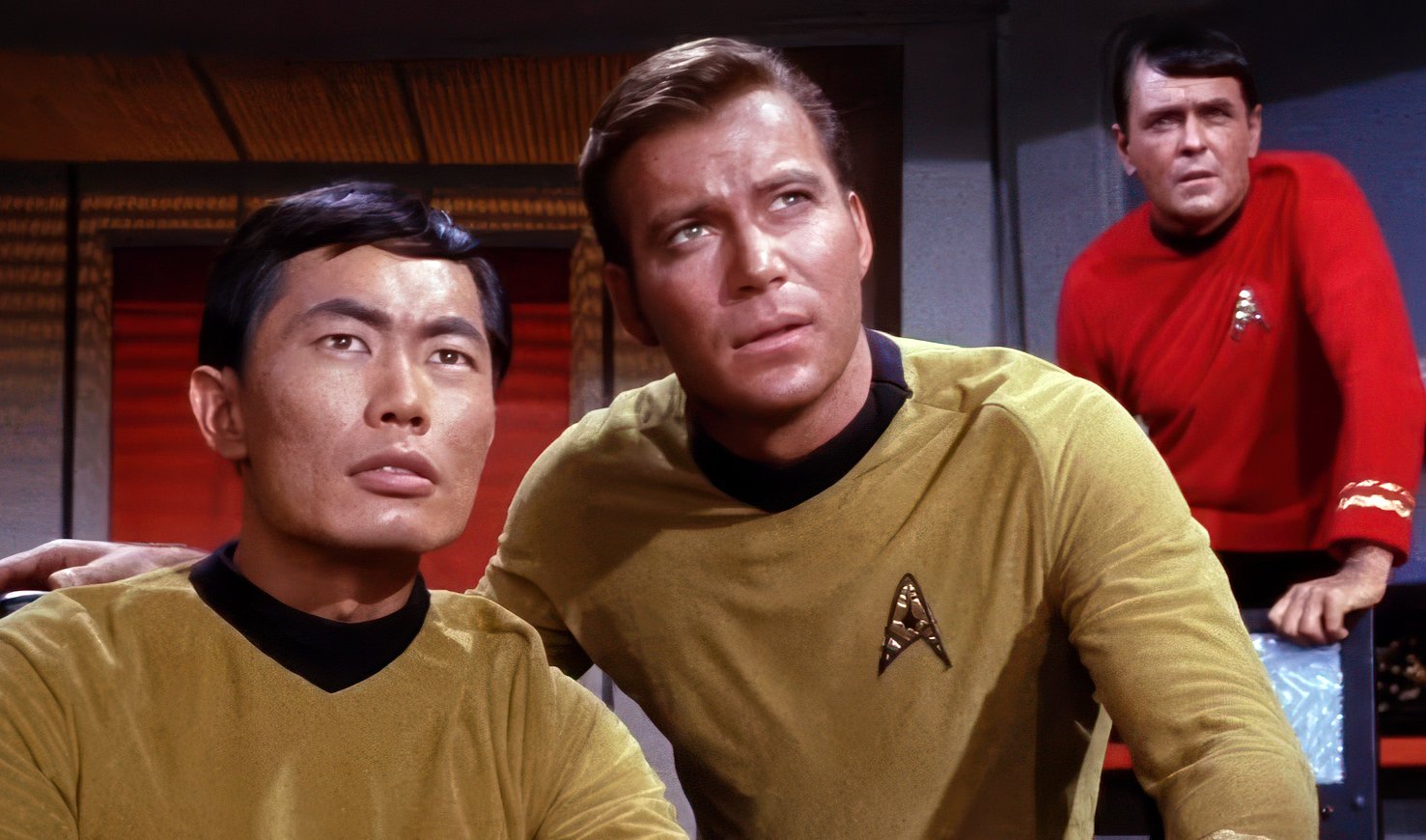
This loving concern for something that was obviously more than just another fantastic TV series was expressed in fan mail, the bulk of which seemed incredible to the home studio, Paramount, and in the “Trekker” conventions that have been held throughout the world during the past few years.
One such convention, “Imagi-Con,” will be held Saturday at Lincoln High School, with Takei, Roddy McDowall (of “Planet of the Apes”) and Bruce Hyde in attendance. (Hyde is a relatively obscure actor, but since he appeared in two “Star Trek” episodes he is almost as significant to the canon as, say, William Shatner or Leonard Nimoy.)
“Imagi-Con” will feature two complete shows at 8:30 a.m. and 4:30 p.m. and will highlight artwork, crafts, photography and what Takei calls “gimcracks” — all the bodywear, memorabilia and merchandising that is a natural part of “Star Trek.”
Takei has traveled all over the world as a result of the Phenomenon, and since his “asking price” isn’t as high as some of the bigger names of the cast he is more likely than they to show up where the Trekkers are gathering.
The popularity of these conventions has given Takei’s once-flagging career the boost of a jet engine. He has served on the panel that selects Emmy Award winners; he is a member of the Democratic State Central Committee and he is currently serving on the Board of Directors of the Southern California Rapid Transit District. He even accepts an occasional acting job.
Takei, who made a special trip to San Francisco for the express purpose of talking to the press (at his own time and expense, a phenomenon in itself), credits Roddenberry with the success of “Star Trek.”
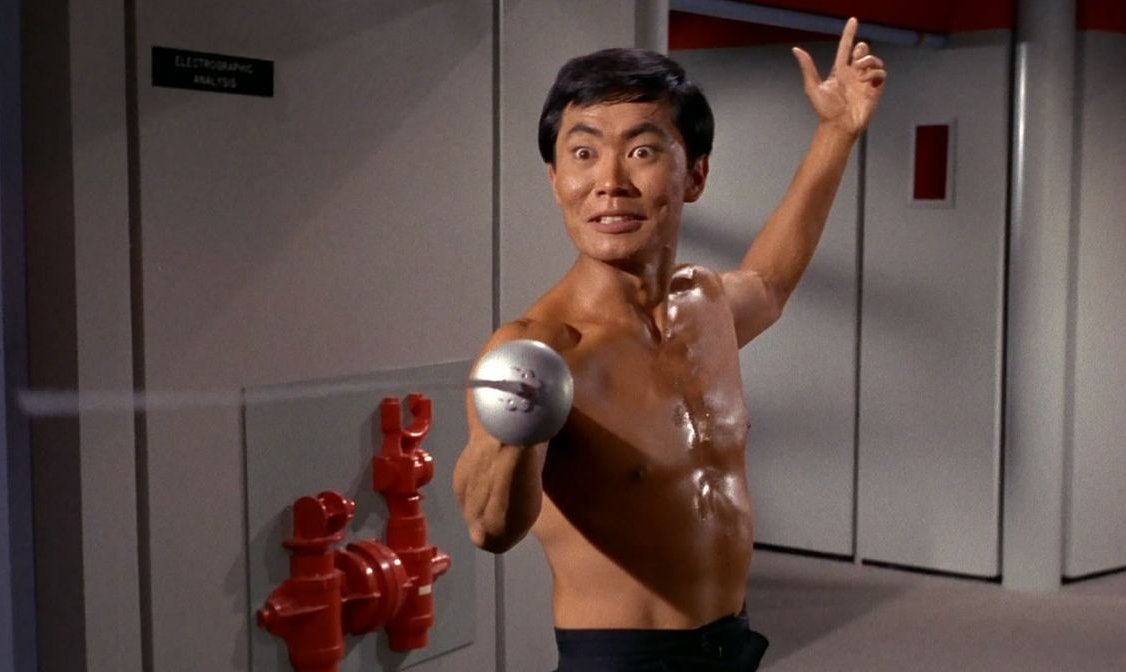
“Gene dealt in nuances, in gray areas that allowed the characters never to lose their credibility factor. It was the juxtaposition of personality and temperament among the trio of players (Kirk, Spock, McCoy) that gave the shows their lasting flavor.”
On the other hand, he credits the fans for generating the phenomenon. “It started with fan mail, went to fanzines (amateur publications) and materialized with its mystique fully formed in the conventions.”
Takei sees beyond the immediate adulation and mild hysteria surrounding the conventions and looks upon them as a means of reaching the general public to generate support for the space program. “Science fiction makes science reality,” he stresses. “Right now we’re trying to remind people that they, as taxpayers, are the ultimate boss of NASA, an organization that has been remiss in keeping the public informed and aware.”
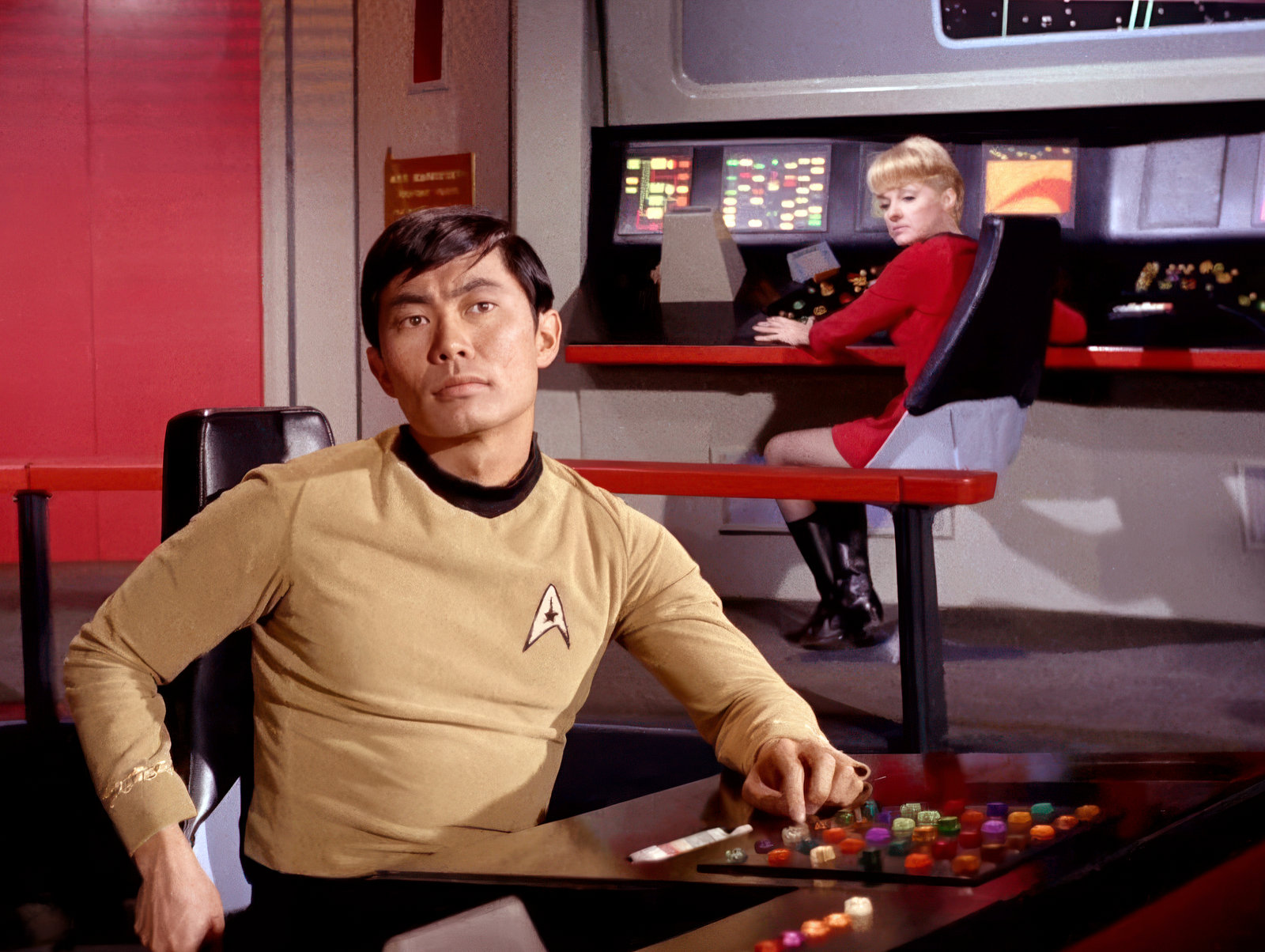
“Star Trek” moved beyond show business in a positive way recently in Palmdale when NASA’s new space shuttle was named the USS Enterprise after the Starship of Kirk’s command.
“Originally the name Constitution had been selected,” says Takei, “but the Trekkers bombarded NASA with more mail than it could ignore.” Such is the singular power of this TV series.
The big excitement in the “Trekkie” world today is Paramount’s plan to produce a multi-million-dollar film epic under the direction of Philip Kaufmann.” Rumors, many of them substantiated by Takei. have it that Leonard Nimoy is holding out for a maximum sum of money, although the rest of the original cast has agreed to agree.
“I’m sympathetic for Leonard,” savs Takei. “The success from a Character like Spock can keep you from other roles, the image definitely deters. He’s entitled to remuneration that will make up for all the Opportunities closed to him.” Takei is confident the film will go before the cameras in March ’77.
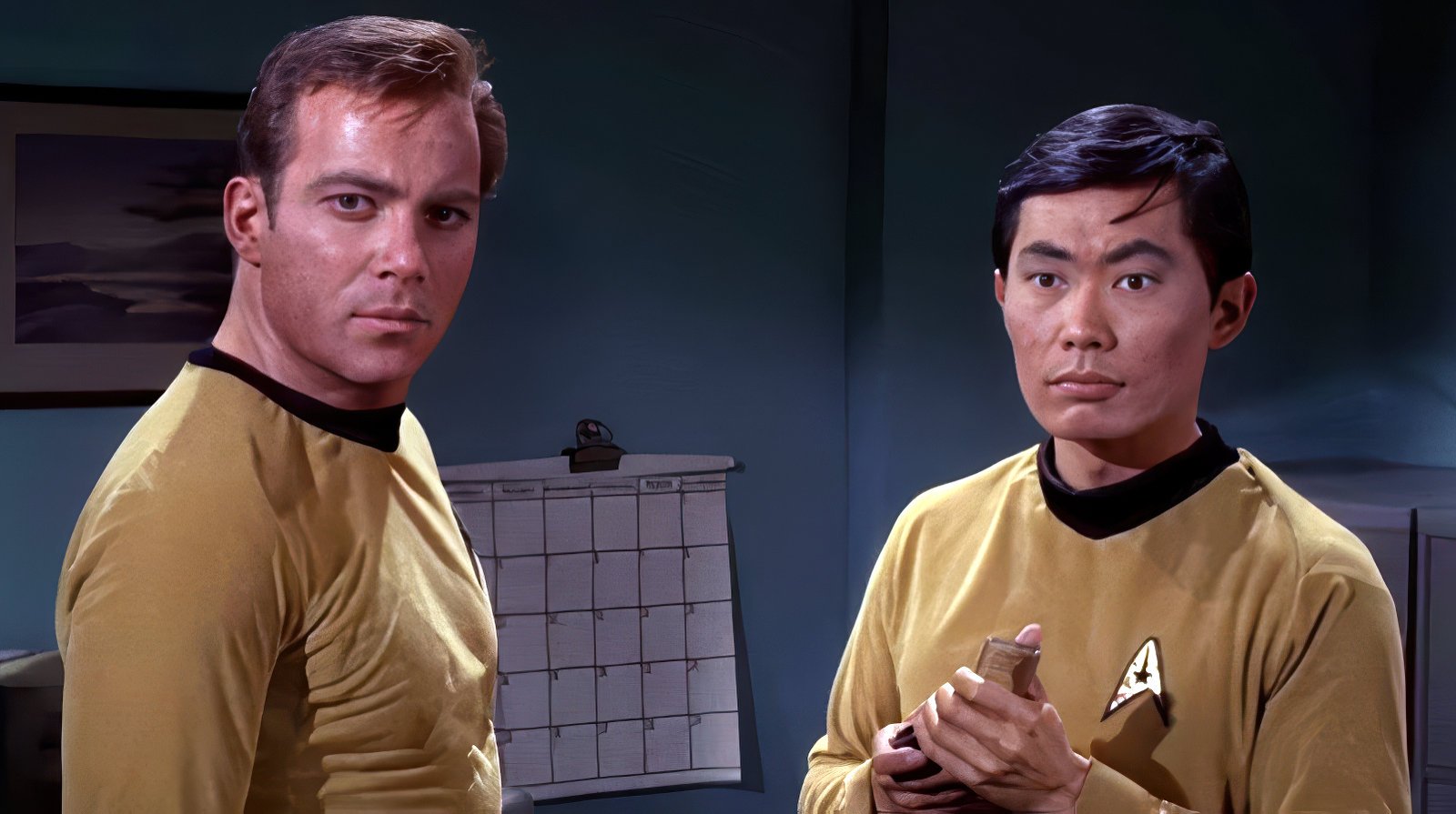
Why has not Paramount moved sooner to capitalize on the global popularity of “Star Trek?” Takei claims, “All of the sets, costumes and props from the 1960s are gone. There was a great lack of security on the part of the studio and most of these now-precious items were stolen.” (One might assume these items periodically resurface at conventions, on sale to the highest-bidding Trekkers.)
“The cost to start a new series has until now been prohibitive, but once the film is made, I believe Paramount will use the new materials to underwrite a TV pilot. There is a good likelihood that a new ‘Star Trek’ series will return to the TV screen.”
Original article title “Second Banana Spaceman Became a Phenomenon”
Former ‘Star-trekker’ in Chinatown (1975)
Anderson Herald Bulletin (Anderson, IN) January 11, 1975
The words were portentous, and the speaker’s voice tinged with the promise of exotic adventure: “Space — the final frontier…”
And, with cameras infiltrating unnamed galaxies, so began each week television’s most successful science-fiction program, the cult-inspiring “Star Trek.”
As any fan knows, the international crew of the Starship Enterprise, entrusted with its mandate “to boldly go where no man has gone before,” included a rather boyish-looking but usually somber-faced Asian helmsman named Mr Sulu.
George Takei, no longer boyish-looking at 34, remembers the role fondly. But he can’t help noting that his forthcoming TV role in Frank Chin’s “The Year of the Dragon” is a powerful reminder that Mr Sulu’s world — where yellow, black and white (and even Vulcan) could live and work together with dignity and a common sense of purpose — is still far from being a reality.
Takei, a Japanese-American who spent part of his childhood in American concentration camps, plays the central figure in Chin’s drama of a Chinese-American family struggling for identity in San Francisco’s Chinatown. Premiered last spring at the American Place Theatre in New York, “The Year of the Dragon” will be telecast on Wednesday at 9 pm on channels 49 and 26 over PBS in the “Theater In America” series.
Born near Los Angeles in 1940, Takei was scarcely two years old when his family, including a brother and sister, were forcibly moved to a remote section of Arkansas and, in effect, imprisoned there. His mother, who was born in this country, was particularly bitter, he explained.
“She was ready to renounce her citizenship and move the family to Japan after the war. My father, well, he was able to look at it more philosophically. He said the American form of government was only as good as the people who were running it. Democracy failed them because those people failed, he told us. But he wanted to stay and we did.”

The three Takei children grew up in America and began professional careers. George’s brother is a periodontist who practices in Los Angeles and teaches at UCLA. His sister is an elementary school teacher in the Watts section of Los Angeles. “And I’m the black sheep in the family,” he adds.
An exuberant and good-humored man who gives no hint of a chip on his shoulder, Takei nevertheless knows the depth of the injustice done to his and other Japanese-American families who shared the humiliation and physical hardships of the camps.
“I’m very glad I was so young when this all happened,” he said. “If the experience hasn’t left any deep scars, it’s because of my parents. They told us we were on a long vacation in the country, and they always did their best to make it seem that way.”
Takei, who, incidentally, served as a pro-McGovern delegate to the 1972 Democratic Convention, was a reluctant architecture student at Berkeley when he decided to take a chance on what he most wanted to do — acting.
“Rather than go through life regretting all the ‘I could haves,’ I decided to try it,” he recalled. “I wanted to go to New York. My father was against the whole thing, but he suggested a compromise that worked out well for me.”
Takei stayed in school in California, but he switched to UCLA and obtained a BA and an MA in theater arts. Later he studied additionally at Sophia University in Tokyo and the Shakespeare Institute at Stratford-on-Avon.
Takei eventually returned to California and nothing much happened until “Star Trek” came along in 1966.
